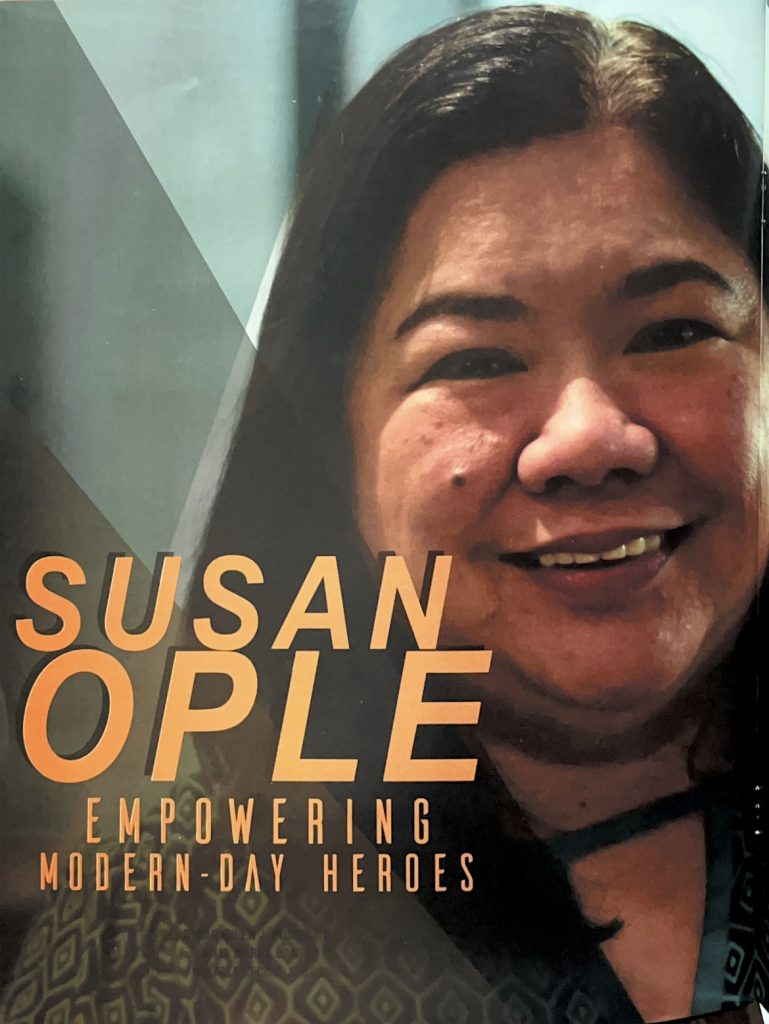
Editor’s Note: This article was originally published in Vol. 53, Issue No. 3 of The Flame on P.Y. 2017-2018.
“Just like my father before me, I am also here for them. It’s my life mission to help them and just make sure that their rights are protected, their voices are heard.”
A HEAVY dinner and a phone call to relatives in the Philippines are blessings to any Overseas Filipino Worker (OFW). In certain cases, however, they are not considered gifts but signs of a tragic end drawing near.
Susan “Toots” Ople knows this all too well. Having been an advocate for OFWs’ rights virtually all her life, she has had to carry the heavy burden of informing already distressed parents in the country that their child working overseas has been scheduled for execution.
But on good days, Ople and her hardworking team at the Blas F. Ople Policy Center and Training Institute (Ople Center) got to do the unthinkable: they brought home OFWs and saved them from their dire circumstances abroad. It is these very moments that reminded Ople to continue doing what she does best—protecting and fighting for our modern-day heroes.
Continuing a family legacy
Ople’s father, fondly called Ka Blas, was a man of few words but countless admirable actions. Susan, his youngest daughter, was among the many witnesses to his dedication as labor minister during the Marcos regime. She shared that her father, being a man of humble beginnings, knew how to interact with the common folk.
“[‘Y]ung tatay ko, pumupunta siya sa hilera ng jeep sa harap ng bahay namin. So [sila] ang kakwentuhan niya,” Ople recalled.
“‘Yung perspective ng labor, nasa kanya kasi sanay siyang makipag-usap talaga sa mga manggagawa.”
It is no wonder why his daughter became so heavily invested in migrants’ rights. The communication arts alumna worked for Ka Blas’ officer when he was a senator and foreign minister. In 2004, then-president Gloria Macapagal-Arroyo saw Ople’s passion and potential and appointed her as labor undersecretary.
The death of Susan’s father was a defining moment in her life that pushed her to continue championing migrants’ rights. Guided by a renewed sense of purpose, she established the Ople Center, a non-government organization for labor and migration concerns, to continue the legacy of her father.
“When he died, so many people—complete strangers—went to his funeral, went to his wake […] Nakita namin na ang laki pala ng impact ng buhay ng tatay namin. So ‘yun ‘yung dahilan kung bakit may Ople Center ngayon. Feeling kasi namin, [sa] bawat OFW na natutulungan ng Ople Center, parang nag-aalay kami ng bulaklak sa puntod ng tatay ko,” she recounted.
Through highs and lows
The joy Ople saw in the eyes of the people she helped also brought her happiness. She lived for the moments when families are brought back together—their warm hugs, wide smiles and tears of joy radiating a deep longing finally fulfilled.
She remembered dearly the case of OFW Jonad Langamin. Langamin was on death row in Saudi Arabia after a fatal brawl with a Filipino co-worker but was freed after Ople pleaded to authorities and the aggrieved family.
“Nung unang niyakap ni Jonard ‘yung nanay niya sa airport, parang ang hirap na hindi ka rin maiyak kasi alam mo na kahit papaano naging part ka ng kalayaan nung tao,” she shared with The Flame, with one hand on her chest as if reminiscing what she felt.
However, the sadness that comes with announcing the death of a loved one to his/her family never ceases to bring her to tears.
“It’s not a glamorous job. We have to do the most painful things, and we also have to do what’s good for the OFW and the family,” she said.
Running the Ople Center is an everyday rollercoaster ride for the OFW advocate. While problems like the lack of budget to fund their services have sometimes led them to nearly close down the center, she knows that they must go on because there are people who still need their help.
“There were other several cases na tuwing magsasara kami, may dadating na kakaibang case,” she recalled. “So ngayon, resolved na namin: whatever it takes, we will keep on going.”
In search of better days
The OFW advocate understood that having to leave a family behind to work in a foreign land is never easy for anyone. That is why she envisioned a better future for Filipino migrants; she aspired that OFWs would no longer risk their lives abroad to provide for their families.
“Ang vision ko is that more of them would be coming home not as victims, but by choice—because they want to be investors, they want to be innovators,” Ople said.
She saw the country as a better home for many Filipinos. She hoped for a more accommodating Philippines, a country filled with endless opportunities for its countrymen. For now, Ople wants struggling OFWs to know there is hope.
“Just like my father before me, I am also here for them. It’s my life mission to help them and just make sure that their rights are protected, their voices are heard,” she declared.
Ople told children of OFWs to set their parents as inspiration to achieve their goals.
“Be proud of who you are. Be proud of the sacrifices of your parents and do your best and make [them] proud. Don’t use their absence in your life as an excuse to destroy your own future,” she said. F – with reports from Mark Joseph Fernandez



